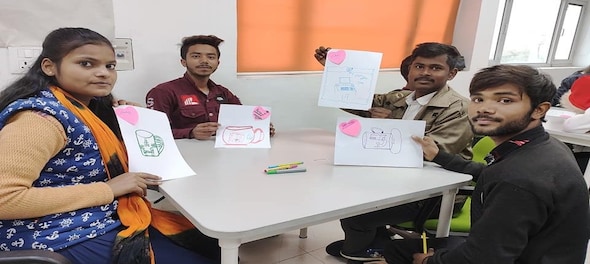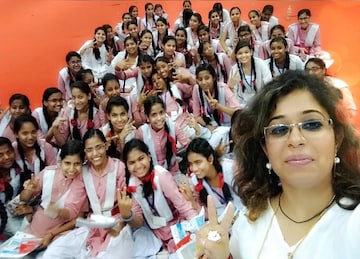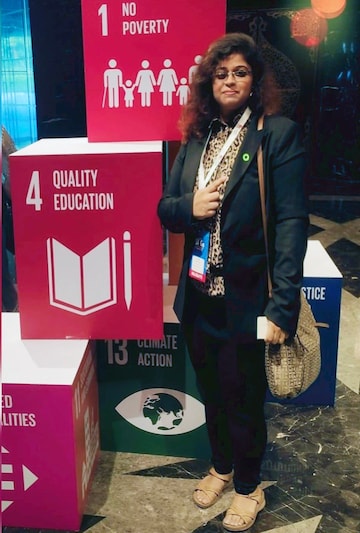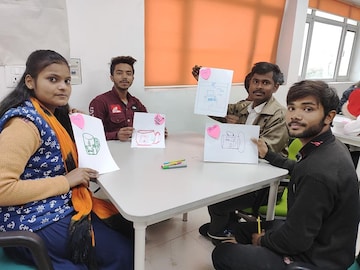
India is sitting on a precarious perch when it comes to its population dividend. The informal sector that takes care of about 93 per cent of the workforce does not have any skilling mechanism, and largely depends on the skill development taking place on the job. “The situation calls for a quick reorganisation of the skill-development ecosystem. It is an essential ingredient for future economic growth if India is to transform into a diversified and internationally competitive economy,” says Delhi-based social entrepreneur Meghna Joshi, who has set out to do something about it.
Having worked several years in the corporate and social sectors handling operations and imparting training, Meghna gained a deep understanding of the “pain points” of students coming from economically weaker backgrounds as well as their employers. To resolve these issues through a systematic process, the 29-year-old recently launched her social venture SWAN (Skilled Workforce Advancing Nation).
“We’re trying to kindle hope among the youth (18–30 years) from the resource-poor sections of society by providing them with quality training to improve their skills and personality,” says Meghna, who holds a Bachelor’s degree in business economics and a Master’s in environment and development.

“Skill development is a buzzword for the 21st century. It has the potential to enhance the quality of life of a major sector of the population, and act as a catalyst for ushering social equality, opportunities for all, and a move towards eradication of poverty,” avers Meghna, who was born to a geologist father and an accountant mother both of whom worked in senior positions in the Government of India until recently. Her father, who specialises in polar studies, is currently a guest faculty with the University of Delhi, and is one of her key supporters at SWAN.
Meghna was always a talented child. A gifted artist, she won several awards in school, including at the state level. She continued to paint landscapes while in college, until one day, her curiosity to learn more about nature began manifesting in a newfound interest in bird-watching and avian photography. “The bright colours and smooth flights of birds fascinated me and inspired me as an artist. Their calls sounded musical to me,” she shares.

Confronted with shocking facts of household sparrows vanishing, vultures facing extinction and several species of birds missing their roosting sites due to changing habitats, she became committed to avian wellbeing. This led her to become state coordinator for an annual campus event by Bird Count India, a coordinated effort to document bird life in various campuses across India through the app ‘e-bird’.
In the meantime, she worked in the corporate and social sector, until she set up SWAN last year, naming her venture after the bird linked to the Hindu goddess of education, Saraswati. “Our classroom learning module is driven through student inquiry, interactive dialogues, industry exposure and cognitive empathy. We want to enable students to realise their full potential,” Meghna says. Her organisation provides continuous mentorship to young people, helping them find jobs, and even with post-placement assistance.
“India has a distinct advantage over advanced economies in having a larger percentage of a young workforce and this contrast may become starker in the years to come. However, it has a similarity with developed economies in the declining percentage of youth joining the workforce. This trend is attributed to a larger proportion of young people joining schools in comparison to the previous years. This is a welcome trend for countries like India where sustained efforts by successive governmental and other agencies in the field of basic education and curtailing of child labour have brought positive results,” she avers.

“However, for a large chunk of the youth, the lack of basic skills needed for employment after completing school or graduation does not present a rosy scenario. Employers have found that only about 25 per cent of Indian graduates are ‘employable’ in the organised sector. Some of the reasons could be a very dismal connection between formal and vocational education, meagre training facilities, under-qualified trainers and lack of infrastructural facilities,” she says, quoting a UNDP study.
For a large population like India, upskilling its youth across the country cannot be accomplished through the conventional education framework, she goes on. “The government alone cannot accomplish such a gigantic task. While corporate institutions have done their bit to complement the ‘Skill India’ mission and have increased the number of youth trained in different vocational skills, there is still a significant number of skilled and unskilled youth who are unemployed. Addressing this issue in a comprehensive manner would call for a concerted effort by the government, private players and NGOs.”
First published in eShe magazine
First Published: Feb 21, 2020 1:49 PM IST
Check out our in-depth Market Coverage, Business News & get real-time Stock Market Updates on CNBC-TV18. Also, Watch our channels CNBC-TV18, CNBC Awaaz and CNBC Bajar Live on-the-go!


PM Modi visits Ram Mandir for first time since 'Pran Pratishtha', offers prayers before roadshow
May 5, 2024 8:59 PM
Visiting temples, obliging selfie requests, jabbing rivals – Kangana Ranaut is wooing voters on campaign trail
May 5, 2024 8:23 PM

